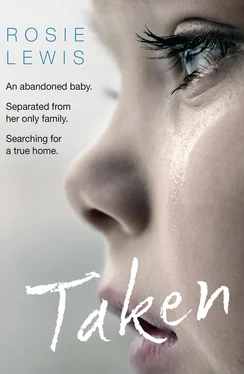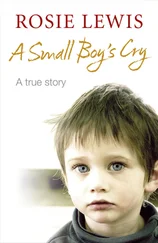Driving away from hospital the next morning, guilt washed over me. Zadie had spent ten weeks in my care but hadn’t felt able to confide in me – a failing that no foster carer would be keen to admit to. Not only that, but I had overlooked signs that now seemed so obvious, such as her unexplained nausea, frantic exercising, no evidence of monthly periods – I felt such a fool.
My mother had held the fort at home and it was a relief to share some of my fears for Zadie over a cup of tea when I got back. It was only after she’d left that the wider implications of Zadie’s pregnancy began to sink in.
Soft mutterings from Megan’s carrycot interrupted my thoughts and drew me to the dining room, and as I lifted her up the first thing I realised was that she had slept for a whole hour without crying out in pain. Thrilled at this first sign of progress, I kissed her forehead, her soft skin warm against my lips. Her small splayed fingers moved purposely through the air as I carried her along the hall, her lips moving with such deliberation as she stared up at me that it really felt like she was miming. ‘Yes, I know what you’re trying to tell me, my love, I know,’ I said, smiling down at her. ‘Your first comfortable sleep. I’m very happy about that too.’
The living room looked like the storeroom in the basement of a shockingly disorganised branch of a baby-merchandising retailer. Apart from all the usual baby equipment, there were baby gifts dotted all around the room; a pink and white blanket crocheted by my mother, a pile of assorted furry and velour soft toys and fluffy blankets from our neighbours all along the street, and a small pink kitten from Peggy.
I was just contemplating the arrival of a second baby in the house and all the associated regalia that might entail, when another thought struck me – what if Peggy decided, when she heard the news, that two babies and a teenager was too much for one foster carer to cope with? Might she worry that my attention would be too thinly stretched? If that was the case, there was a chance that, on the basis of ‘last-in, first-out’, Megan might be moved on to another foster carer.
A fair number of the foster carers at Bright Heights Fostering Agency operated a strict ‘no babies’ policy, but there were plenty of others who loved caring for newborns.
I lowered Megan onto her padded mat and gently removed her wet nappy. Her legs were still so thin and scrawny that I couldn’t wait to tuck them back into her sleep suit, for fear they might break. As I dabbed her bottom with damp cotton wool, my eyes fixed on the stump of an umbilical cord clinging stubbornly to her tummy. It was sad to think of any baby being parted from their mother so soon after birth. I felt a pang in my chest at the prospect of Megan going through yet another separation so early on in her life.
When Zadie came home the next day she broke down and told me the whole horrific story – she had fled the family home to escape her abusive elder brother, and by then she was already three months pregnant. After talking to me she fell into an exhausted sleep and, with Megan asleep in her carrycot, I took the opportunity to email a report to Peggy while the disclosure was still fresh in my mind.
Foster carers are encouraged to keep detailed and accurate notes because, in some cases, their records are summoned by the courts to form part of the case for the prosecution in any criminal trial. I force myself to listen passively if a child makes a disclosure, however strong the temptation to elicit more information from them. Most children possess a strong desire to please and so, if they’re asked a question more than once, there’s always a risk that they might alter their answer in the mistaken belief that they haven’t said what the adult wants to hear. In that way, well-meaning carers asking intrusive questions can influence a child’s testimony, thereby prejudicing the case.
Peggy called after breakfast the next morning, shock and concern audible in her tone. Her voice had that slightly echoey quality created by activating the loudspeaker mode and instinctively I lowered my voice, feeling slightly self-conscious. We discussed Zadie and the prospect of her continuing with the pregnancy and then I took a deep breath. ‘What about Megan?’
‘No change as far as I’m concerned,’ Peggy said in that definite, no negotiation tone of hers. ‘I can’t think of a better way for Zadie to learn about caring for a baby than watching someone she trusts do it, can you?’
Relieved, I leaned against the wall and loosened my grip on the cord of the telephone. It sprang out of my hand and vibrated against the receiver. ‘No, no, I can’t. Thanks, Peggy,’ I added after a moment, slightly worried that I’d been worrying in the first place. I was well aware that I needed to keep myself in check, striking the right balance between giving Megan everything she needed, everything she deserved, and all the while bearing in mind that our time together was limited.
‘Anyway, if things go to plan Megan might have moved on to adopters by then.’
‘Great,’ I said, pleased that Peggy was still committed to keeping to tight timescales in Megan’s case. There was no doubt that making the transition from foster to forever family early on in her life would help to minimise any lasting sense of trauma and loss – we were often told in training that separating a child from their main caregiver could have profound effects, interfering with their development and the quality of all of their future intimate relationships as well as impacting on their self-esteem, social skills and long-term mental health – and, infinitely less important but nonetheless also present in the back of my mind, it would be easier for all of us to let her go. ‘Now, before I forget, Megan’s LAC review is scheduled for tomorrow at ten. I’ll need you there obviously.’
‘Tomorrow?!’ I cried, exasperated. ‘That’s a bit late notice to arrange cover, isn’t it?’ Looked after children, or LAC, reviews were meetings held at regular intervals during a child’s time in care to discuss their care plan and keep everyone involved in looking after them – the child’s parents, their foster carers, school or nursery teachers, health professionals and, in certain circumstances, police officers – updated in terms of their progress and any difficulties they may be experiencing. In other circumstances I would have been happy for Emily to babysit while I popped out, but local authority rules dictated that looked after children must only be cared for by registered back-up carers with a minimum age restriction of 18.
Peggy tutted. ‘Well, you’ll just have to bring the children along if you can’t organise something in time.’ There was a crackle on the line and a shuffling of papers. I pictured the social worker tapping urgent notes in a Word document using one finger on the keyboard and motioning silent, stern commands to the administration staff around her with the other.
A whirlwind character, Peggy never held back from speaking her mind and I had heard on the grapevine that her blunt honesty had put one or two noses out of joint in her office, particularly those of the senior management. Despite being sent on repeated diversity and equality training refresher days, she refused to toe the party line simply to keep her bosses happy, steadfastly sticking to her strongly held views.
Once, so I’m told, she brought her dog into the office for a week when he was unwell, in direct defiance of instructions from above. Through closed doors, in the middle of a heated ‘discussion’ with one of her line managers, Peggy was overheard to say, ‘I haven’t taken a day off sick in ten years, not a single one, which is more than I can say for you lily-livered lot with your stress vacations and mini-breakdowns. Now, either Pug stays and I work, or I’m taking unpaid leave until he’s better. It’s up to you.’ Despite misgivings, the manager caved in and Pug spent the week resting in his basket underneath Peggy’s desk.
Читать дальше












